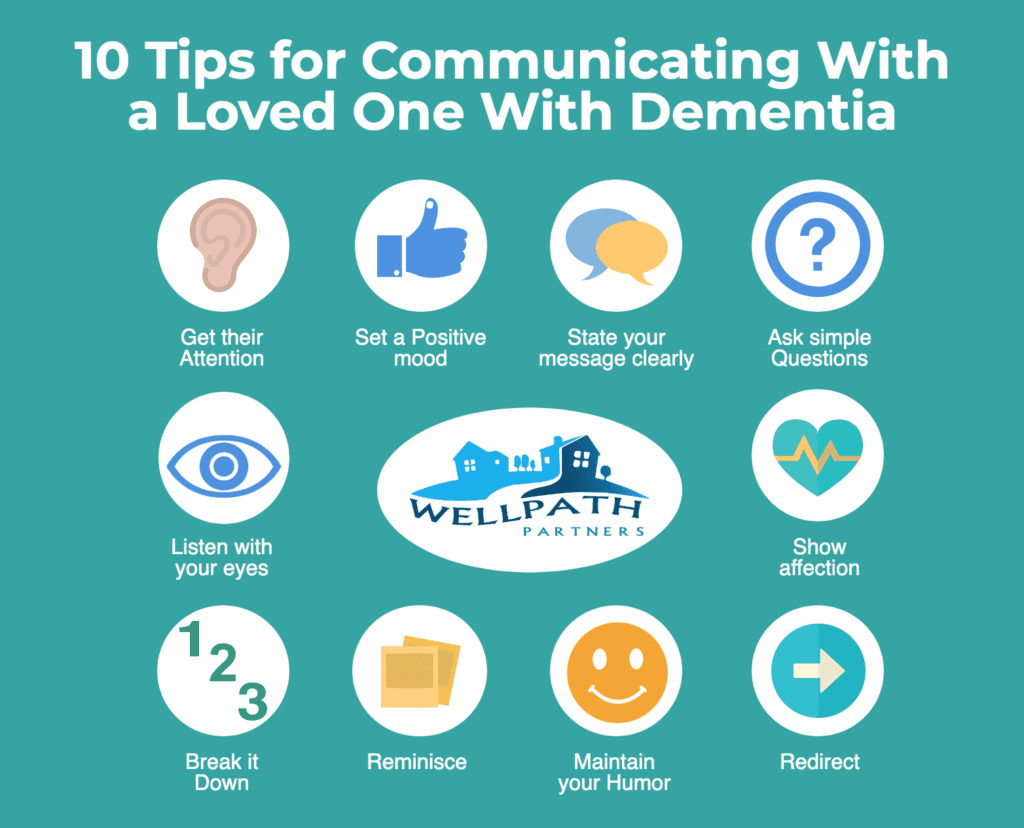
The first step of empathizing with anyone is walking a mile in their shoes. In order to effectively support someone with dementia, one must first understand what dementia is and how it affects patients. Dementia is not a specific disease. It’s an umbrella term that describes a group of symptoms associated with a decline in memory or other thinking skills severe enough to interfere with daily functioning. People with dementia may have problems with focus and short-term memory. This can interfere with daily operations such as: finding keys, wallet, and other necessities.
Other major obstacles people with dementia face are difficulty with communication and language. Communication itself however, remains necessary for mental and social well-being of everyone, especially dementia patients. For the loved one of a patient with dementia, frequent communication must be held as a dutiful responsibility to promote health in old age. Understandably, this can be difficult for anyone. Communicating with someone with dementia can feel unnatural as dementia effects communication in an unnatural way. We aren’t born knowing how to communicate with a person with dementia—but we can learn. Improving your communication skills will help make caregiving less stressful and will likely improve the quality of your relationship with your loved one.
- Get the person’s attention.
As dementia patients struggle with maintaining focus, it is important to get their undivided attention with limited distraction. Eliminate noise interference by turning off the radio or TV, close the curtains or shut the door, move closer or to quieter surroundings. Before speaking, respectfully call the person by their name, identify yourself by name and relation, and use nonverbal cues and touch to help keep them focused. If they are seated, it can definitely help to bend down to their level and maintain eye contact. - Set a positive mood for interaction. The way you go into a conversation plays a big role on the way it will play out. It is important to keep a light, cheerful tone and effectively convey it- even before speaking. Your attitude and body language communicate your feelings and thoughts more strongly than your words do. Use facial expressions, tone of voice, and physical touch to help convey your message and show your feelings of affection.
- State your message clearly. People with dementia may struggle recalling title names or definitions of large words. Remember to explain things through using simple words and sentences. Speak slowly, distinctly, and in a reassuring tone. Refrain from raising your voice higher or louder; instead, pitch your voice lower.
- Ask simple, answerable questions. So not to overwhelm someone, ask one question at a time; those with yes or no answers work best. Refrain from asking open-ended questions or giving too many choices. Visual prompts and cues also help clarify your question and can guide response.
- Listen with your ears, eyes, and heart. Patience is key. Remember the goal is to keep your loved one comfortable in good company. With this goal in mind, be patient in waiting for your loved one’s reply and keep your own tone in check. Watch for nonverbal cues and body language, and respond appropriately. Always strive to listen for the meaning and feelings that underlie the words.
- Break down activities into a series of steps. Simple Activities for Daily Living (ADL’s) may seem daunting to people with dementia. You can provide effective assistance with ADLs by breaking them down step-by-step. This makes many tasks much more manageable.
- When the going gets tough, distract and redirect. If your loved one becomes upset or agitated, try changing the subject or the environment. Never say ‘no’ to a request. Instead, redirect the conversation to a new topic until they forget. For example, suggest activity like going for a walk. It is important to connect with the person on a feeling level, before you redirect. You might say, “I see you’re feeling sad—I’m sorry you’re upset. Let’s go get something to eat.”
- Respond with affection and reassurance. People with dementia often feel confused, anxious, and unsure of themselves. Further, they often get reality confused and may recall things that never really occurred. Avoid trying to convince them they are wrong. Stay focused on the feelings they are demonstrating (which are real) and respond with verbal and physical expressions of comfort, support, and reassurance. Sometimes holding hands, touching, hugging, and praise will get the person to respond when all else fails.
- Remember the good old days. Reminiscing the past is often a soothing and affirming activity. Many people with dementia may not remember what happened 45 minutes ago, but they can clearly recall their lives 45 years earlier. Therefore, avoid asking questions that rely on short-term memory, such as asking the person what they had for lunch. Instead, try asking general questions about the person’s distant past—this information is more likely to be retained.
- Maintain your sense of humor. Use humor whenever possible, though not at the person’s expense. People with dementia tend to retain their social skills and are usually delighted to laugh along with you.
Caring for your loved one with Dementia may be a daunting responsibility requiring lots of patience. Nonetheless, you can rest assured that there are many ways to support your aging loved one with dementia. WellPath Partners provides a full range of services to find the best memory care and assisted living facilities for your loved one. WellPath Partners is here to guide you every step of the way because we prioritize your care.
WellPath Partners is your senior resource referral guide. Follow us on ALL social media platforms and join us weekly form more content and public health discussion.
By
Prithvi Chauhan
